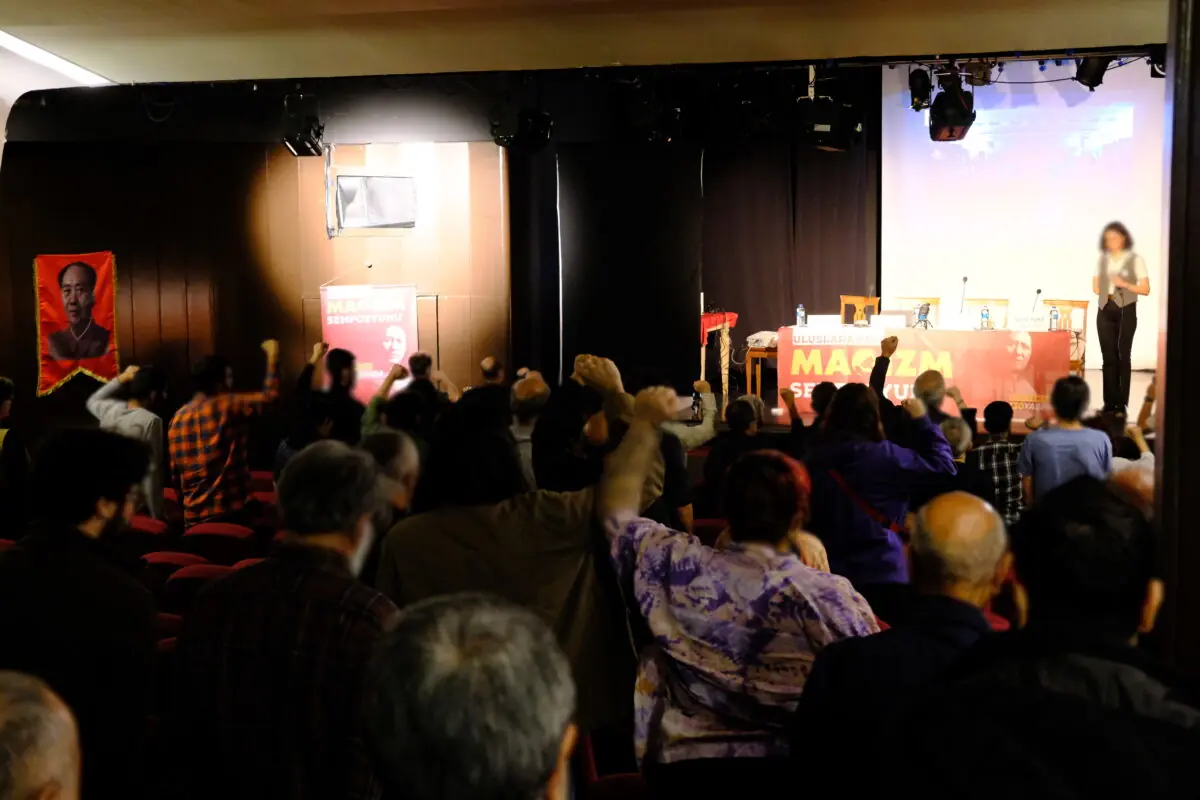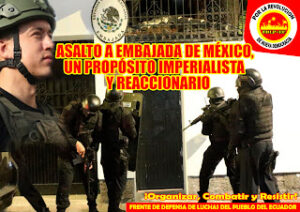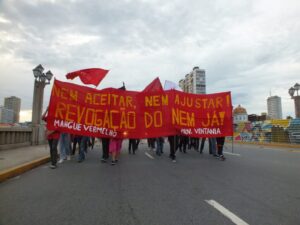
International symposium on Maoism successfully concluded
We hereby publish a more extended article send to us regarding the International Symposium on Maoism in Turkey. We have previously reported shortly on the event.
The international symposium on Maoism, organised by Umut Yayımcılık, came to an end after the international conference.
In the third session, lectures were held under the title “Maoism as a defence of proletarian internationalism”. A large number of people attended the 2nd day of the symposium, which was also attended by speakers from Turkey, India, Brazil and Germany.
In the third session, lectures were held under the title “Maoism as a defence of proletarian internationalism”. On the second day of the symposium, which was also attended by speakers from Turkey, India, Brazil and Germany, the number of participants was large.
The symposium began with a minute’s silence in memory of those who immortalised themselves in the fight for revolution and communism, after which the partisan oath was sworn.
If the revolution is to be Won,
our Leader İbrahim, İbrahim Kaypakkaya
Let the proletariat March behind him
on a Marxist-Leninist-Maoist red path
with a people’s war
to power, to power, to power
Firstly, the Maoist leader Ajith from India gave a lecture on “Experiences of the Maoist movement in India and Nepal, the success of Maoism against modern revisionism”.
In terms of redefining the criteria of modernisation, Ajith emphasised that modernisation manifested itself in different forms in Western countries and other semi-colonial countries. It was mentioned that in the modernities where colonialism took place, a typical modernity developed in which the colonial political power tried to suppress everything. At this point, he explained that understanding Maoism provides a profound perspective on the forms in which imperialism continues to exist in semi-colonial countries. It was emphasised that the transformation of feudalism took place within capitalism and was encouraged by imperialism. It was mentioned that a complete transformation from feudalism to capitalism has not taken place and that feudal values persist in various forms. In this sense, it was mentioned that there are different contexts that differentiate semi-feudal countries from capitalist countries. It was emphasised that India has a very layered structure and that there are segmented class strata. After Ajith’s observations on Brahmanism, the next lecture was started.
“OUR WEAPON IS THE MASSES”
He was the second speaker from the editorial team of the Rote Post to begin his presentation.
The speaker first welcomed the audience and then informed them about the history of the Rote Post. The speaker then went on to discuss the general political situation in the world and the political situation in Germany in particular, citing the example that the political struggle between the proletariat and the bourgeoisie manifests itself in strike waves and the participation of the peasants in the struggle against the monopolies. Analysing the youth and environmental movements, he said that although these movements could be directed by the bourgeoisie, they were basically a rejection of its order and stressed that the revolutionary movement was developing. With regard to the fact that the revisionists in Germany are divided, the speaker referred to the existence of a revolutionary situation.
The Maoist understanding of the front in Germany was then discussed and it was emphasised that only the Party can lead its own construction, and the front must be a class front in order for the socialist revolution to be successful.
It was pointed out that the anti-revisionist and anti-fascist struggle must be developed and that this question is an important point in the reconstruction of the party. It was explained that the revolution must be seen as a class struggle and that this can be realised under the leadership of the Communist Party. The importance of political leadership and the need for mass support for the creation of a national front were emphasised, and the indispensability of ideological unity was pointed out. It was mentioned that the Maoists must work on very broad platforms, develop their influence on the masses and convey the work of the front to the masses. The speaker pointed out that the theoretical and practical task is to carry out mass work and explained the principles of “living together”, “working together” and “fighting together”.
It was emphasised that the principle of struggle and war should always be kept in mind and the concrete situation should be analysed when formulating political goals. The speaker mentioned that the party cannot heroise the masses without a mass character and talked about the importance of taking up the struggle with the masses.
“The revolutionaries can unite with the people’s war. We cannot be without the masses, our only weapon is the masses,” the speaker concluded his lecture, pointing to revisionism.
“LET US FIGHT RELENTLESSLY AGAINST REVISIONISM”
After the Red Post speaker, the Partizan representative gave a lecture entitled “Communist ideas against imperialism and collaborators of all kinds”.
The representative of the partisans emphasised that Maoism was a new level of communist thinking and said: “The confrontation between the proletariat and the bourgeoisie is the source of universality.” It was said that the adoption of Maoism by the communist movement cannot be independent of the struggle against imperialism and all its collaborators. The representative of Partizan, who pointed out that the solution to the problem of national liberation and the peasants makes Maoism unique, mentioned that one must understand imperialism in order to understand Maoism. It was emphasised that Lenin explained how to fight against imperialism, the most advanced stage of capitalism, and that Mao’s struggle emerged from Leninism, indicating universality.
When the Communist Party was built to develop the revolution in Russia, the Mensheviks faced the Bolsheviks, the civil war had to be waged against the Mensheviks, and it was emphasised that a similar process took place in China. It was mentioned that imperialism and its domestic collaborators attacked communism, and that revisionism took a stance to prevent imperialism from being hit. It was emphasised that the struggle against revisionism is the struggle against imperialism.
Finally, the representative of the partisans addressed the question of the “universality of the People’s War”. She explained the universal and specific principles of the People’s War.
“WE NEED A MAOIST LEADERSHIP”
After the speech of the partisan representative, the speaker of the Revolutionary Front for the Defence of People’s Rights (FRRDP) began her speech entitled “Marxism-Leninism-Maoism, Internationalism and Democratic Revolution” with the words: “Greet the masses, the fighters and the Maoist communist parties leading the people’s wars in Peru, India, the Philippines and Turkey!”. The speaker’s greeting was greeted with enthusiasm and applause by the masses.
She said that the significance and greatness of Chairman Mao can be summarised by the three greatest revolutionary events of the 20th century: “The Great October Socialist Revolution, the Great Chinese Revolution and the Great Proletarian Cultural Revolution. Two of these three great events were personally and directly carried out by Chairman Mao”.
The speaker points out that Chairman Mao has shown that the transformation of the democratic revolution into the socialist revolution corresponds to an uninterrupted transition from the stage of new democracy to the socialist stage of revolution in semi-colonial and semi-feudal countries.
“The generalisation and development of the theory of bureaucratic capitalism, based on the work of Chairman Mao Zedong, is therefore a great contribution of Chairman Gonzalo with universal validity; it corresponds to the development of Marxist political economy, which is indispensable today to prove the validity of the New Democratic Revolution in all colonial and semi-colonial countries of the world.”
The speaker then referred to the Palestinian resistance and said that the world proletarian revolution urgently needs a Maoist leadership.
“GREETINGS FROM THE RUINED WALLS”
After the end of the presentations, the messages sent to the symposium were read out. 17 June Platform for Democratic Rights, ICL (International Communist League), messages from Spain, India, Columbia, Peru and from prisoner-partisans were read out.
Imprisoned partisans said: “We hold on to our struggle, to communism and to our party. This symposium organised by Umut-Yayımcılık is a step towards spreading Maoism, bringing light into the darkness and serving the greatest cause of all. We enthusiastically welcome the symposium within the dilapidated walls and wish success to the revolutionaries and communists fighting in all corners of the world.”
“WE ARE PROUD”
“As the International Communist League, we hereby convey our sincere greetings to the People’s War in India, the Philippines, Turkey and Peru, which hold high the red flag and are a shining light for all proletarians, oppressed peoples and oppressed nations of the world. It is a great honour and pleasure for us to send our greetings to the People’s War and the struggle for the New Democratic Revolution, which is being waged with great sacrifice and heroism under the leadership of the Party of the Proletariat, which is advancing with the invincible line of İbrahim Kaypakkaya. We are very proud to be in the ranks of comrades like Nubar and Rosa,” and emphasised the significance and importance of the symposium. After the reading of the messages, the free speech session began. In this session, contributions and criticisms of the lectures were presented.
After the free speech, the symposium was successfully concluded.

